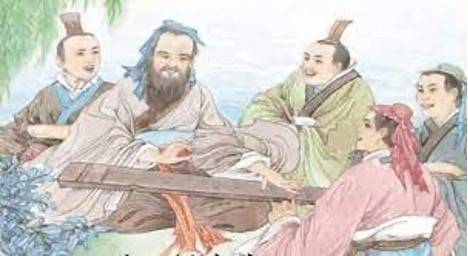ONE DAY, CONFUCIUS asked four of his students to tell him about the greatest thing they would like to achieve.
“I’d like to help rule a troubled land and bring peace to it,” said one.
“I’d like to govern a poor place and raise it to prosperity,” said another.
The third was a humbler young man. “I’d like to be a civil servant, but a competent one,” he said.
The fourth one was playing his zither, and didn’t answer at all. After finishing the piece of music he was playing, he looked up at his teacher, and eventually said: “I’d like to hang out with a group of friends on a spring day, and we’d go swimming in the river, and then we’d enjoy the cool breeze. At the end of the day, we’d sing all the way home.”
Confucius smiled – and said he had liked the fourth answer best. People had all sorts of notions about the grand things they should achieve in their lives, but it’s actually the little things in life, like spending a perfect day with the people you love, which are ultimately the most important of all.

THE WISE STUDENT
That fourth student was a man named Zeng Dian, from the State of Lu (a place today in Shandong province), where Confucius himself had been born. Zeng was probably older than the others, having been born in 546 BC, making him just five years younger than Confucius himself.
The great sage of Chinese history had a number of students who became well known themselves, but in this essay we will look at Zeng Dian.
Confucius never wrote a book, so his students collected his sayings and stories, over several generations. The young men themselves often appeared in Confucius’ stories, so their actions, good and bad, were presented as lessons to the world.
LIKE FATHER, LIKE SON
Zeng Dian was a married man with a child, and he was eventually outshone by his rather bright son.
In one recorded anecdote, the young boy, called Shen, is helping to cut the weeds from the crops. But the child accidentally cuts the crops by mistake. Furious, the father beats the boy.
The boy recovers and looks at his father. “Dad,” he says. “I hope you didn’t hurt your hand.”
Zeng Dian is full of remorse about his actions—but his son, who has picked up his father’s musical habit, decided to play some music to comfort him.
The book of sayings and stories, known as The Analects of Confucius, probably took its final form after about 300 years, and ended up with more references to the wise son Zeng Shen than to his father Zeng Dian.
IMPORTANCE OF TRUTH
Shen grew up, and had his own wife and child, but remained a loyal student of Confucius. One story starts with Shen’s wife deciding to go shopping. Their young son began to cry, not wanting her to leave. She decided to offer him a treat – “Wait for me at home, darling, and when I get back, we’ll slaughter the pig for our dinner.”
In those days, such a thing would only be done on very special occasions. The boy was comforted and let his mother go out for the day.
When she returned, her husband took the knife and went to kill the pig.
“We don’t really have to do that,” she objected.
“Yes, we do,” Shen replied. “Otherwise, you will have taught our child to tell lies.”
They had roast pork for supper.

STILL EMERGING
Information about Confucius and his students is still emerging. As recently as 2011, archaeologists digging in Nanchang, the Jiangxi provincial capital, found an ancient copy of The Analects and even an image of the great teacher with two students.
The ancient book is still filled with wisdom we can learn from today. One of Confucius’s sayings that was recorded was a simple declaration: “Rice to eat, water to drink, and my bended arm for a pillow: that’s happiness.”
That saying, one suspects, may have been inspired by his zither-playing student Zeng Dian.
Image at the top by Helena Lopes on Unsplash
